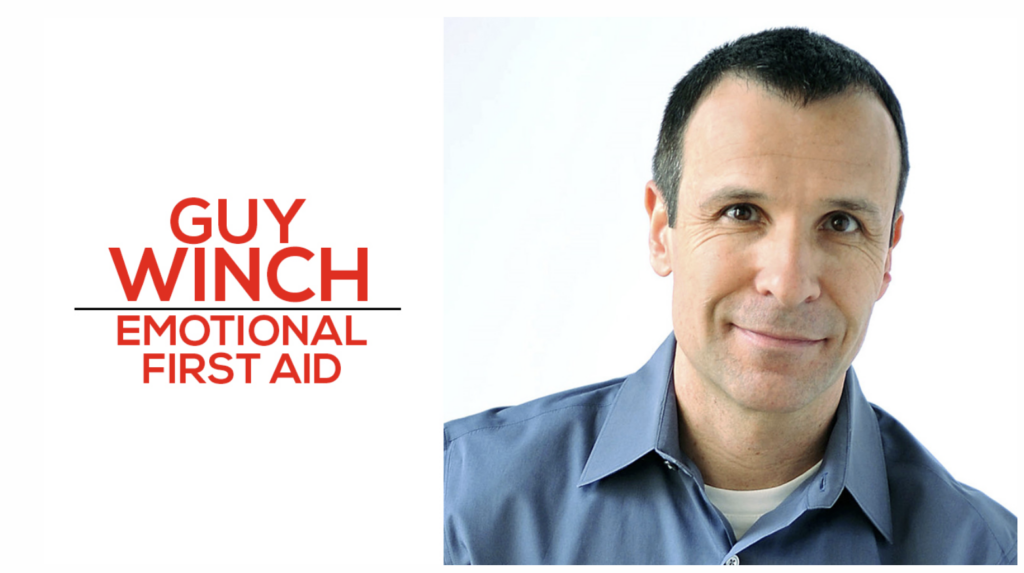While it’s well-known that recovering from addiction is a non-linear process, it’s more difficult to tell what throws people off course. After getting clean and sober, the difficulty of staying clean and sober is often a surprise—particularly when drugs and alcohol were previously used to medicate many different discomforts and psychological issues. It’s the latter that Guy Winch, a licensed psychologist, author and pioneer of the concept of Emotional First Aid, has taken aim at.
Winch got his doctorate in clinical psychology from New York University, completing a post-doc at NYU Medical School. Though he has a private practice in Manhattan where he sees individuals and couples for psychotherapy, he has also written books such as The Squeaky Wheel and Emotional First Aid. Perhaps what he’s most popularly known for, though, are his wildly popular TED Talks about practicing emotional first aid and fixing a broken heart. While his work has all kinds of helpful applications, it applies particularly well to addiction recovery.
In a recent interview with Joe Polish, Winch expanded on his concept of emotional first aid: “We really know how to address physical injuries when we have them,” he says. “We have no such practice whatsoever when it comes to emotional or psychological injuries.” As it turns out, the “injuries” that we try to ignore the most are the things that create the most problems for us. “Injuries like failure, rejection, loneliness, guilt,” Winch says. “Unless we’re aware of these things, we’re just going to get deeper in and sustain more damage than we need.”
Becoming aware of our emotional state is a practice Winch calls emotional hygiene—and according to Winch, we should all strive to make it part of our everyday life. “One of the things I’m really for is…gratitude exercises,” Winch says. “A gratitude exercise is getting up in the morning and saying, ‘You know what? The people I really care about right now are healthy, my parents are in good health, I’m really grateful for that because there may be a time in the future where that may not be the case.’”
Research shows that substance abuse disorders are often strongly correlated to a variety of mental health issues—issues which can further worsen our emotional states. Although this isn’t specific only to people with diagnosed disorders, overly negative self-talk is one of the negative symptoms of mental illness that Winch says is a major culprit. “The self-critical internal voice that so many of us have in so many frustrating moments is absolutely useless,” he says. “It’s purely damaging, there is no utility to it.”
While negative self-talk can have any number of causes, it can sometimes be exacerbated or caused by underlying trauma. Some addiction experts like Gabor Maté have theorized that trauma or a lack of connection may be to blame for all (or at least nearly all) of addiction. While Winch agrees that trauma can be a cause, he hesitates to give a blanket explanation—and says that the reality of trauma is much more complex.
“It only takes a few seconds to have trauma,” Winch says. “It’s not a quantitative thing, it’s a qualitative thing. Trauma is something that shocks the system, something that’s impactful enough that it causes you to reassess and rethink your general views on yourself, on life, on the people around you. It causes a fundamental shift, a seismic shift in your psychological system.”
Much like his concept of emotional hygiene, Winch similarly agrees that untreated trauma could lead addicts back to drugs and alcohol, or to negative emotional states that then lead to drugs and alcohol. “When I read that ‘the generalized approach to trauma should be this or that,’ it’s hard for me to endorse,” he says. “You have to have some kind of understanding of it in a way that gives it meaning. In the narrative of your life, it has to be a plot point that leads to something of significance.” While for some people this may mean excavating the experiences, others, according to Winch, may not need to.
Perhaps the underlying problem for recovering addicts, as Winch sees it, is one of positive and negative identity—particularly as they relate to trauma and negative self-talk. “Having a strong sense of self is actually really important,” Winch says. “At a certain level of addiction, it is so prominent in [an addict’s] life that it is the organizing principle. Many people get sober but they can’t maintain it. The problem there is that the addiction has become so central in their lives that there is nothing else central enough to attract them into another way of being.”
For his part, Winch has hope from his practice and his understanding of psychology that people can make changes in their habits to increase their chances of recovery. “I’m not a psychiatrist,” he says,” but my general thought is that it’s a two-way street. Our brain chemistry, our wiring, those kinds of things, impact our behavior significantly. But there are things we can do, behaviors we can assume, that will impact our brain chemistry.” Still, he notes that it’s a bit more complicated than that. “The impact of neurochemistry on our behavior is like a six-lane highway,” he says. “Our ability to impact brain chemistry and hormones by thinking or behavior is like a single-lane country road.”
Because of these hard facts, Winch also advocates getting on medication whenever necessary to treat depression, anxiety or whatever else may be ailing a person. With that chemical boost, people can then begin positive habits to reinforce their change. What all these disparate threads have in common, according to Winch, is simple. “Self-awareness,” he says. “When you hear yourself go through the same argument and it’s not going to get anywhere, stop doing that. That’s my advice in general. When things aren’t working for you, change the script. Don’t just try the same thing but try harder. Change the system.”



